Mary Anne Yarde's Blog: The Coffee Pot Book Club , page 107
January 13, 2020
Check out L. Salt's fabulous new book — The Seeds of Stars #NewRelease @LSalt1

The Seeds of StarsBy L. Salt

The life doesn’t promise to be joyful for a “Chernobyl child” born straight after the nuclear disaster. True…but not for such an adventurer, adrenaline junkie, and popular extreme sports’ blogger like Yuliy Kobrin, aka Kobra. Adopted by a British couple, Kobra spends his life in urban exploring and travels.Skiing in the Scottish Highlands, Kobra meets a young German couple, Edel Baum and Kira Schneider. The new friends invite him to their luxurious house, where Kobra’s attention is drawn to Edel’s collection of World War II antiques and a mysterious Yugoslavian file which the couple asks to translate for them. The file reveals classified underwater facilities from the Cold War times, hidden deeply into the Kotor Bay of Montenegro. Yuliy can’t miss an opportunity for such a discovery.
Six months earlier, a prominent scientist died in his apartment in central Berlin. The authorities believe it was a heart attack, but a police officer, Trina Stahl, thinks this case is far more dangerous and complicated.
All hell breaks loose for Kobra, when he comes under attack in the Kotor Bay, when he realises his new German friends are not who they say they are, and his life now is of an interest for many parties. From Montenegro to Scotland, from Berlin to the Isle of Skye—Kobra is on the hunt for a mysterious alien object, the Seeds of Stars, but also for the truth about his own past.
Excerpt
He made a circle around the deck. ‘The structure is still excessively strong.’ He touched the rigging. ‘No serious corrosion as such.’
‘Told you, she looks good for her age.’ Edel winked, inviting him to the bridge. ‘Even the gun’s turret is still spinning.’ He had pulled a couple of metal switches on the control panel, and the turret turned slightly to the left, to the right, and stopped in its original position.
‘Cool!’ Kobra observed the control panel. His attention was attracted by the radio. ‘Does it work?’
‘It does now.’ Edel nodded proudly. ‘I spent a few days last week trying to fix it, but in the end…’
Without any further explanations, he switched it on, and his companion could hear a distinctive crackling of the old-fashioned communication device.
‘Amazing.’ Kobra still couldn’t believe his eyes and ears. Once again, a long-forgotten and abandoned piece of history had gained a new life. ‘So, what’s the problem with the engine? If everything else is in such a good working condition, then…’
‘I don’t know.’ Edel just shrugged. ‘That’s what surprised me as well. The surplus company looked after the boat, but didn’t bother to fix the main thing—her engine. To be honest, I’m not very good with mechanics.’ He sounded almost apologetic. ‘Electronics, hardware, software…yes, please. They’re my area of expertise, but mechanics…’
‘That’s probably why they’ve sold the boat so cheap,’ Kira entered their conversation, descending from the deck. ‘The sun is coming out and the sky looks much clearer,’ she added. ‘It seems like the storm has passed by.’
‘Great.’ Edel clapped his hands. ‘It would be good to start the boat.’ He shot Kobra a pleading look.
‘Ah, okay.’ Yuliy smiled, understanding his hint. ‘I’ll try my best.’
After Edel gave him some special rubber gloves and opened the engine’s compartment, Kobra started his observation.
‘All parts look alright, not even as corroded as I expected them to be.’ He checked a couple of pipes and cogs.
‘I’ve tried to clean and oil as many bits as I could.’ Edel moved closer to him.
‘And the fuel tank?’ Kobra continued his examination, trying to open the tank. ‘Was it empty? Or was it some old fuel left in it? Have you tried to change it?’
‘I put some new fuel in it, but…’ Edel had started, but Kobra interrupted him.
‘Wait a minute. It seems like…’ He stretched his hands into the oily darkness of the tank. ‘Something big is in there.’
‘What?’ the couple asked in chorus.
‘Maybe some kind of debris?’ Kira suggested.
‘No, it’s soft.’ Kobra’s hand kept on pulling something that felt like a roll. ‘It’s a…It’s a…’
He made the last final attempt and, spilling leftover fuel everywhere, pulled out a sealed, rolled plastic package.
‘What is this?’ Edel stared at Kobra’s finding in disbelief. ‘And what on Earth it’s doing in the fuel tank?’
‘Somebody tried to hide something extremely important here.’ His fiancée nodded to the parcel.
‘What are we waiting for? Let’s open it,’ Kobra suggested, wiping the package off and removing his gloves.
It looked like a journal with a few dozen of album-size pages banded together in one plump file. Most of the pages were yellow and rough, faded away, but the text, formulae, graphics, and pictures were still in a readable condition.
‘Sovershenno sekretno,’ Kobra read the square stamp on the top of the file’s cover.
‘Is it in Russian?’ Edel frowned.
‘Well, yeah. It translates to top secret.’ Kobra was looking through the pages.
‘Do you understand the rest of it?’ Kira moved closer.
‘I can try to read the whole document, but…’ He started unsurely.
‘Why are Russian classified documents hidden in the fuel tank of the Yugoslavian coastguard boat?’ Edel mumbled more to himself.
‘Don’t forget Yugoslavia was Soviet in those days. Russian was one of its official languages.’ Kobra raised his amber eyes from the file.
‘Besides, this package might be written by Russians.’ Kira supported his guess.
‘So, what does it say?’ Her fiancé shifted on his feet impatiently.
‘It looks like it describes some kind of research which was carried out in some secret facilities in a place called, ehm…the Boka Kotorska Bay.’
‘Where exactly is it?’ Kira asked.
‘Let me Google it.’ Edel pulled his iPhone out of the pocket. ‘The Boka Kotorska Bay or the Bay of Kotoris the name of the winding bay of the Adriatic Sea in south-western Montenegro,’ he read the first line of the Wikipedia page.
‘It makes perfect sense.’ Kobra nodded. ‘You’ve told me you bought this vessel from Montenegro.’
‘We need to know more about this boat, her previous owner, and how it happened that the surplus company hasn’t discovered these documents,’ Kobra suggested.
‘As for the company, most likely, these guys buy stuff in bulk,’ Edel tried to find a reasonable explanation. ‘Let’s say, they’ve bought three or even four such kind of boats. Three of them worked alright. So they sold them quickly. This one might’ve been waiting to be sold for years, languishing in a dry dock or a warehouse.’
‘Most of the documents are dated 1975,’ Kira commented.
‘Look,’ Edel pointed to the pictures of photos. ‘These look like photos of a landscape as if they’ve been made from a plane or a drone.’
‘Somebody spied on this place in the Kotor Bay,’ Kobra summed up. ‘Whoever it was, he or she knew Russian or worked for Russians, or both. The spy or spies wanted to come back for this package, but clearly, they failed.’
Pick up your copy ofThe Seeds of StarsAmazon UK • Amazon US
L. Salt
 L. Salt is a multi-genre author from the United Kingdom. She studied History of World Culture and earned her Master’s Degree in Art Expertise at the St. Petersburg University of Culture and Arts. Born in Belarus, she lived for many years in Ukraine and Russia and, eventually, settled in the North of England, where she currently lives with her husband. Salt’s interest in writing dates back to her teenage years. Apart from creative writing, she has a passion for traveling, arts, history, and foreign languages.
L. Salt is a multi-genre author from the United Kingdom. She studied History of World Culture and earned her Master’s Degree in Art Expertise at the St. Petersburg University of Culture and Arts. Born in Belarus, she lived for many years in Ukraine and Russia and, eventually, settled in the North of England, where she currently lives with her husband. Salt’s interest in writing dates back to her teenage years. Apart from creative writing, she has a passion for traveling, arts, history, and foreign languages.Her debut novella, His Personal Reich was released in April 2018 by Crazy Ink Publishing. It will also be featured in the boxed set Chills and Thrills in May 2019. Her second novella, a thriller/mystery story Legacy of the Iron Eagle, released in February 2019. She is the author of the Off the Ways Seriesincluding The Ways We Follow (Book One)and Angels of Zion (Book Two). Her short stories have appeared in numerous anthologies, including the Crazy Ink Publishing anthologies Royal Scoundrels and Beyond Wonderland, as well as magazines, both online, and in print. Another of her suspenseful stories, The Seeds of Stars, will release in December.
Connect with L. Salt: Blog • Amazon • Twitter • Facebook Page • Facebook Group • Pinterest • Linkedin • Goodreads • AllAuthor.
Published on January 13, 2020 20:00
#BookReview — The Year the Swans Came by Barbara Spencer #mustread #Fantasy @BarbaraSpencerO
 The Year the Swans CameBy Barbara Spencer
The Year the Swans CameBy Barbara Spencer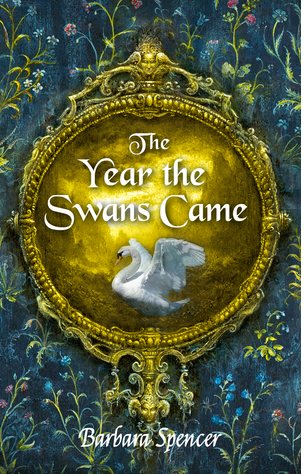
Ruth and Maidy have been best friends for as long as they can remember. Stunningly beautiful, rich, and wilful, Ruth has always insisted she will marry Pieter, Maidy’s eldest brother, only for him to vanish from their lives late one night.
Is his disappearance linked to the arrival of the swans, feared as cursed and birds of ill-fortune? What will happen when they return six years later, on the morning of Maidy’s sixteenth birthday?
And who exactly is the enigmatic and mysterious Zande?
Follow Ruth and Maidy’s cursed tale of love as they discover what happened to Pieter, how the appearance of Zande will affect the rest of their lives, and just how much destruction Ruth’s beauty can cause.

“Maybe that’s what I should write about; the year the swans came, and my brother, Pieter, vanished...”
No one would speak of Pieter after that. For his younger sister, Margrit “Maidy” Bader, the loss of her brother became a silent heartache, a private grief. Was he dead? Maidy dared not ask her parents. She only knew that no one was allowed to sit in his chair at the table — it was waiting, as they all were waiting, for him to come home again.
The swans which Maidy had thought so beautiful with their polished silk feathers, but her mother irrationally feared, returned on her sixteenth birthday. Was her mother, right? Were the swans an ill omen? Something evil? Maidy thought not. However, their return would bring undeniable heartache to all those whom their spirits touched. For Maidy, her life would never be the same again.
From a daring rescue of a swan to the devastating truth about Klüsta— the island of a thousand rumours, The Year The Swans Came by Barbara Spencer is the hauntingly gripping, yet enthralling story of a secret that threatens to destroy not only the swans, but the Bader family as well.
With a lusciously detailed narrative that mesmerised me from the opening chapter, The Year The Swans Came is in all ways a work of exceptional scholarship. This book, these characters, captured my imagination, and I was swept away to a world that is vivid, evocative, and utterly irresistible. Words cannot express how much I loved this book. The brilliance is in the writing. The Year The Swans Came is in all ways, an absolute triumph.
With an elegant turn of phrase and a visceral understanding of human fragility, Spencer has presented her readers with some unforgettable characters. The heroine of this story, Maidy, is a character that I simply adored. Maidy reminded me a little of Hans Christian Andersen’s The Ugly Duckling. Maidy believes herself plain, unattractive even. She lives in the shadow of her best-friend — the very glamorous Ruth, who all the boys at college want to date. But like that ugly duckling, there is a swan, a beautiful, graceful, caring swan just waiting to fluff her feathers and step into the light. Maidy is entirely ignorant of how she is perceived by others, especially Zande, who is the male version of Ruth. However, her goodness is incorruptible — even Zande, who is free with his love, does not attempt to corrupt her. Maidy is an extremely likeable character and one I came to care about very much. This story is told from her point of view, which I thought gave this book a sense of authenticity, as well as a sense of realism.
All the characters in this book are fabulous, and each has their role to play. One of the characters that I took a strong dislike to was Ruth. Ruth is incredibly self-centred and a truly terrible friend. She is self-seeking and does not care for the pain she causes others. Ruth uses her good looks and her father’s money to get what she wants regardless of the consequences. Maidy slowly comes to realise the kind of person Ruth is, and as she does so, Maidy does not like what she sees. But even as they begin to drift apart, Maidy still cannot see how exceptional she is in her own right — Maidy still believes that Ruth is the one that all the boys want to be with, which isn’t true. Ruth is not quite an antagonist, I wouldn’t go that far, but her egotistical behaviours certainly demonstrates the goodness that is in Maidy’s soul.
I have to mention Zande — Zande, with his charm and easy smile which hide a lifetime of sorrow and a soul that is trapped. He is in every way a bad-boy, the one you don’t want your daughter dating. But, Maidy sees past the facade and glimpses a deep and terrible pain that she does not understand and can never understand. I thought Zande’s depiction was fabulous.
I could not but help the strong emotional reaction that I had for these characters, and I was impressed by Spencer’s scope and brilliance in their creation. Pieter, Hans, Tristan, Jaan, Zande, Ruth, and Maidy all bring something unique to this story. Wonderful, wonderful characterisation. It doesn’t get better than this. Strangely, no dates are mentioned in this book, only that there had been a war and the community had been invaded at one point by the enemy — one can only assume it is set after World War II and that Ruth’s family are Jewish. But surprisingly, the era seems almost timeless. It matters not what the date is, only that the story is so incredibly captivating. There is magic in the words that Spencer has written, a swirling of emotions that swept me up into its warm embrace. However, as the story picks up momentum and races headlong towards a catastrophically explosive ending, I found myself screaming silently in my head the word NO! And by the time I read the last word and noted the final full-stop, I was sobbing quietly to myself. Spencer demands every conceivable emotion from her readers, and boy does she get it. Be sure to have a box of Kleenex with you because believe me you are going to need it.
The Year The Swans Came is something extraordinary indeed. This is a book that not only deserves your attention — it deserves it again and again until the spine of the book breaks and the pages start to fall out, and you need to purchase another copy. That, is how good this book is.
If you are looking for your next great adventure which will leave you gasping and begging for more then check out The Year the Swans Came by Barbara Spencer. You won’t be disappointed. I cannot wait to read the second book in this fabulous series.
I Highly Recommend.
Review by Mary Anne Yarde.The Coffee Pot Book Club.
Pick up your copy ofThe Year The Swans CameAmazon UK • Amazon US • Waterstones
Barbara Spencer
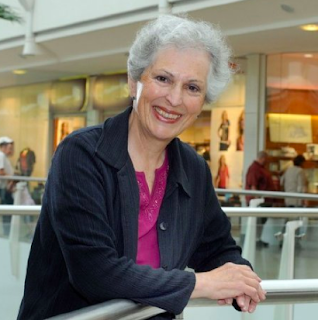
In 1967, Barbara Spencer hi-tailed it to the West Indies to watch cricket, the precursor to a highly colourful career spanning three continents, in which she was caught up in riots, wars, and choosing Miss World. Eventually, she settled in Somerset to bring up a family. In 2010, the publication of Running, her new teenage thriller, has taken Barbara countrywide. Passionate about the importance of books in today's society, Barbara is happiest working with young would-be writers and is frequently invited into schools to talk about creative writing.
Connect with Barbara: Website • Facebook • Twitter.
Published on January 13, 2020 19:00
January 12, 2020
#BookReview — Wayland’s Revenge by Lesley Lodge #HistoricalFiction #MurderMystery @LesleyLodge
 Wayland’s RevengeBy Lesley Lodge
Wayland’s RevengeBy Lesley Lodge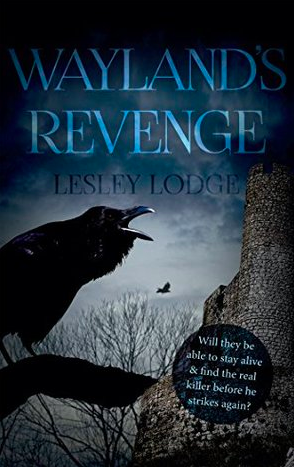
It’s 1647: a time of bitter civil wars in England. Wayland, the village blacksmith, returns from army service to find his wife, Rebecca, murdered and his son traumatised and struck dumb. Wayland’s overpowering desire for revenge is thwarted by the collapse of laws and a dearth of clues to her sadistic killer. Thwarted, that is, until the villagers ask him to investigate a runaway horse. Whilst searching for its rider, he discovers instead the body of a young boy, cut with symbols in the same way as Rebecca’s body had been. The clues abound and confuse with elements of witchcraft, religious hatred and the enmities of civil war.
Wayland sets out on a perilous journey to find the killer, taking with him his son Jonathan and Alun, a canny Welsh baker. But just as they find their first suspect, they are trapped in the brutal Siege of Colchester, facing ever more dangerous challenges. Wayland, Alun and Jonathan must draw on all their strengths, devise new strategies and make agonising decisions, if they are to stay alive and find the real killer before he strikes again.

“Justice is not for the likes of you to give.”
But it wasn’t justice that Wayland sought. It was revenge. If the war had not kept him away, then this would never have happened. Nevertheless, when he found out who was responsible for his wife’s death, then he would let the anger consume him, and he would be avenged. But first, there was something else he had to do.
While searching for the rider of a runaway horse, Wayland stumbles upon a gruesome discovery. A young boy has been brutally murdered, his body defiled by strange yet oddly familiar symbols. Wayland is charged by the Coroner to find out the identity of the boy. But with a brutal Civil War still ravaging the country, Wayland must be careful. With the Royalists so close, if it were to be found out that he once fought on the side of Parliament, the consequences could be dire.
However, time is running out, for the murderer will strike again, it is just a question of when.
With a compelling narrative, crisp prose and captivating characters, all set within the backdrop of the English Civil War, Wayland’s Revenge by Lesley Lodge is the kind of book that lovers of quality historical fiction can get very excited about. Not only is it a fabulous murder mystery, but it is also a poignant story of one man whose life has been torn asunder by the terrible realisation that the one person he had sworn to protect had died while he was away fighting a war that seemingly had no end.
At times Wayland’s Revenge is a heart-wrenching read, and it left me in tears on more than one occasion. Wayland’s reaction to the news that his wife had at first been accused of witchcraft while he was at war was one of utter disbelief, as is the fact that no one dared take a stand against such an injustice. The harrowing account of Rebecca’s trial by water is devastating as it is told from the perspective of her young son. Jonathan is a character who witnesses not only his mother’s trial but her subsequent murder, and because of this he is mute for the majority of this book, but his despair needed no words for Lodge demonstrated his torment and his agony through his actions. I thought Jonathan’s depiction was absolutely brilliant. Kudos, Ms Lodge.
I adored the characterisation of Wayland. Wayland is a man who takes responsibility very seriously. He cannot stand by and see a woman abused, and he will, regardless of who the abuser is, step in and stop it. So to discover that his wife had not only been accused of witchcraft, had faced the trial by water, only to survive it, but was then murdered, almost breaks him. Wayland is torn apart by guilt and his need not only for vengeance but to understand why his wife was taken from him so brutally. He is a man seeking answers, and he will not be content until he has them. However, the war between the King and Parliament sets the pace of his investigation, which at times Wayland finds incredibly frustrating. Wayland isn’t always the hero in this story, and there are times when his anger, his hate, makes him lose all notion of reason, but Lodge always pulls him back when he is tottering on the edge.
Wayland’s reaction to Jonathan was sublime. Wayland does not know how to get through to his son. In a time where there wasn’t therapists or counsellors, I thought the way Wayland handled it was as historically accurate as Lodge could get. Wayland really struggles, he doesn’t know what to say to his son or how to say it, which I thought was incredibly heartbreaking and had me reaching for the Kleenex. There is no doubt in my mind that Lodge certainly has a novelist eye for the human condition, for she has captured every conceivable emotion.
Wayland isn’t on this journey alone, however, Alun is on it with him. Alun is a very grounded individual who can step out of the situation and see things sometimes a little more rationally than Wayland can. Together, they make quite the formidable pair, and if anyone is going to get any answers, it will be these two.
I am not going to talk about the antagonist as I don’t want to give away any spoilers, but I would like to mention the depiction of some of the historical characters in this book. I thought Lodge’s portrayal of Sir Charles Lucas was sublime as was the portrayal of Thomas Fairfax. Lodge brought both of these characters gloriously back to life.
The historical detailing of this book has to be commended. It is painstakingly obvious that Lodge has spent many hours researching this era, for she has brought it back to life in all its magnificent detail. Lodge’s understanding of the events that led up to the massacre of unarmed women after the Battle of Naseby and the harrowing account of life at Colchester during the long eleven-week siege is diligently represented in this remarkable story of war, love, revenge, and finally, closure.
I was excited to read a book where the author had a clear understanding of everything equestrian. This may seem like a small thing to notice, but Lodge’s depiction of the horses was truly wonderful. Coming from an equestrian background, I often lament the way horses are represented in historical fiction. Lodge understands what these majestic animals can and cannot do, and her depiction of the starving animals, and there somewhat bullying behaviour towards each other, while the Royalist were under siege in Colchester was particularly well-drawn.
I thoroughly enjoyed every word, every syllable, every sentence of Wayland’s Revenge by Lesley Lodge. This is the kind of book that I could happily read over and over again.
I Highly Recommend.
Review by Mary Anne Yarde.The Coffee Pot Book Club.
Pick up your copy ofWayland’s RevengeAmazon UK • Amazon US
Lesley Lodge
 Lesley Lodge now lives on a smallholding bafflingly close to Luton after many years working on regeneration projects in south London.
Lesley Lodge now lives on a smallholding bafflingly close to Luton after many years working on regeneration projects in south London.Lesley's historical crime thriller novel, published 2018, is set in 17th century England and features ex-soldier and blacksmith Wayland seeking revenger for the brutal murder of his wife.
Lesley has previously had several short stories published. Blues to Orange, about a farmer ruined by the foot and mouth outbreak, was a Luton Literary Prize Winner. She is a past Time Out and Jim Beam Whiskey Cult Film Buff of the Year.
Connect with Lesley: Website • Blog • Facebook • Twitter.
Published on January 12, 2020 21:00
January 9, 2020
Join #HistoricalFiction author, Vivienne Brereton, as she explores what happens when History hits the small screen #Tudors #Vikings @VivienneBreret1
When History hits the small screen.
By Vivienne Brereton
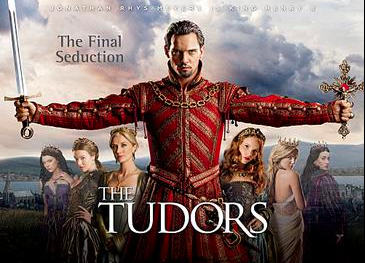
Every history lover has been there. You’ve read your favourite historical novel on a certain period at least twice, every single reference book you can lay your hands on, earned yourself a PhD from the Armchair of History. And now…you’ve heard it’s coming to a TV opposite your very own armchair. You can’t wait. How exciting! Little tidbits are released every so often to whet your appetite so by the time the release date arrives, you’re positively drooling with anticipation. You might even have gathered some fellow Armchair Professors to watch the Big Event, providing them with sustenance to get them through the excitement. You sit down to watch, booing as the last car advert drags on, vowing never to sit in that hapless model ever again. Then the voice comes on saying XYZ is proud to present. Your heart swells to twice its normal size as the credits roll….
The Tudors - Season 1 - Opening Intro
In my case, the big wait was for The Tudors. How I’d anticipated the series for months, read every article, hoping that it would live up to all the hype. I’ll never forget the opening sequence of…an assassination of the English Ambassador in the Ducal Palace of Urbino in 1518. What?! Who? When? Where? The assassins were apparently agents of François I of France, and the victim Henry VIII’s uncle. I sat there for the first few minutes in a totally unfamiliar Tudor landscape, uncomprehending and confused. I’d been expecting a shot of a sexy young Henry (Jonathan Rhys-Meyers) striding athletically around his court in tight yellow leather boots, barking orders at trembling courtiers while sending amorous glances in the direction of the simpering ladies of his long-suffering wife, Katherine (Maria Doyle Kennedy). So who was this unknown (dead) man lying on the floor of the Ducal Palace and how come I’d never heard of an assassination in all my years as an Armchair Historian? He certainly wasn’t Henry’s uncle, I knew that for sure.
Worse was to come. It was later reported that to keep it simpler for a worldwide audience (how patronising and insulting to overseas viewers), Henry’s two sisters, Margaret and Mary had morphed into one. Henry also had a daughter called Mary but that was considered far too difficult for some viewers to deal with. Roll of eyes. Margaret, his older sister, married the dashing King James IV of Scotland but didn’t make it to the final cut. From my own knowledge of Margaret, and how jealous of Mary she was, she wouldn’t have been happy about that. As a consolation prize, Margaret’s name was kept in the show but handed over to her far more beautiful younger sister, Mary, who was Henry’s favourite. This surviving sister, now newly renamed Margaret, romped into a forbidden marriage with Henry’s best friend, Charles Brandon (Henry Cavill) which made for some very torrid scenes. The new Margaret (the former Mary who actually married the ageing King Louis XII of France) married a fictitious King of Portugal but held a candle for Charles Brandon. Looking at the utterly gorgeous Henry Cavill and knowing the charm of the womanizing Brandon, this was not a difficult stretch of the imagination.
By now, you get the picture, I’m sure. The point is does it matter if a series is wildly inaccurate and sexed up for ratings? For me, the answer is a definitive NO! The moment Jonathan Rhys Myers appeared on screen in all his swaggering glory and panther-like menace, he totally owned the part of Henry. As did Natalie Dormer as the alluring, mercurial, brilliant Anne Boleyn. What did it matter if Henry was six foot two and Jonathan five foot nine. Both men (like Brandon) were known for their exceptional good looks, worthy pin-ups of their time. Henry only having one sister could be overlooked (my apologies to Queen Margaret); Jonathan brought Henry to life in all his glory: a beautiful man, clever, sensitive, poetic but slightly cruel, sexy, arrogant, warlike, sporty. A king of kings. To add a little poignancy, in real life, Jonathan battled with his own demons after the death of his beloved mother in Ireland. I’ve long believed that the death of Henry’s mother, Elizabeth of York, when he was a very impressionable ten probably altered his life forever and broke a part of him deep inside.
Natalie Dormer totally nailed Anne. I liked reading that the actress brought a lot of her own beliefs to her interpretation. This included Anne’s involvement in religious reforms. By giving the part to a talented actress with both brains and beauty who loved the period so much she was able to persuade head writer, creator, and executive producer, Michael Hirst to change his interpretation, I would say it was a very shrewd move indeed. An entire line-up of talented stars made the production shine including Sam Neill as Wolsey, Nick Dunning as Thomas Boleyn, James Fraine as Cromwell, and Joely Richardson as Catherine Parr.
Henry meets Ann Boleyn — The Tudors.
At times, I couldn’t help disapproving of the way Hirst seemed on an ego trip, rewriting history on a whim. It seemed a little dangerous considering many people take away the truth from a TV series. Poor old Margaret Tudor, fated to be erased from history five hundred years later, she would have had a right old fit of Tudor temper.
As a writer myself of a Tudor novel, I try and keep as close to the facts as I possibly can because I feel fact is stranger than fiction. That era needed no embellishment whatsoever! If I have to alter dates a little or invent a new twist for a more interesting plotline, I have no problem with that. My series, The House of the Red Duke is a blend of real and imaginary characters anyway, so my imagination is given free reign where necessary.
Vikings : Season 5 - Opening Credits / Intro
After The Tudors, Michael Hirst moved on The Vikings. It would be interesting to hear the views of The Vikings superfans (of whom I know a fair few!). I mentioned The Tudors to Tony Riches, author of a wonderful series on the lives of the Tudors. He, too, had a problem with the Mary/Margaret combo and jokingly suggested they were trying to save money by only using one actress. I also asked Brook Allen, award-winning author of The Antonius Trilogy for her thoughts on Rome, another series I loved but always wondered about its authenticity. For obvious reasons, she was unhappy with the way they portrayed her beloved Mark Antony, even though James Purefoy did a good job with the script. If The Tudors and Jonathan Rhys-Myers captured the essence of Henry Tudor, she didn’t like the very dark portrayal of her hero, giving him a made-up fetish for licking women’s blood.
Thank you, Mary Anne for letting me come on and talk about The Tudors, one of my favourite topics in any form at all, even on a mug!
To make it up to Margaret Tudor and restore her to her rightful place in history, I would like to finish with an excerpt from Book One of The House of the Red Duke. A Phoenix Rising. Here she is in November, 1512, firmly back in the picture, with her handsome Stewart husband. James. He was a cultured man, a fine warrior, possibly the most educated monarch in Europe. And verra popular with the ladies. They’re in Holyrood Palace, Edinburgh. Margaret is in a foul mood, partly because of the worsening relations with her younger brother, Henry, in the kingdom below:
“‘Why won’t my brother listen to you? Instead of trying to break the Treaty of Perpetual Peace between our two lands.’
Not liking the high colour in his wife’s cheeks, James reached out and placed his right hand on her stomach. ‘Calm yourself, hinny. Ye know it’s no’ good for ye to get so tetchy when the birthing chamber is no’ so far off.’
Snatching his hand away, Margaret glared at him. ‘Stop treating me as though I’m still a child. I’ll be twenty-three in nigh on a month.’
‘Forgive me. I was only thinking of the bairn.’
Margaret’s voice was bitter. ‘Of course you were. Of this one and the three others lying useless beneath the sod. Instead of in the nursery at Stirling Castle. Replacing your precious royal bastards.’
James was becoming fearful for his wife’s wellbeing. Unfortunately, Margaret spoke the truth; their only bairn to have survived so far was the wee one named for him. James had hoped for a good breeder like Margaret’s mother and maternal grandmother before her, but she seemed to be favouring her paternal grandmother who’d produced only one son at the tender age of thirteen, and then no more. This one was coming too soon after the April birth, not giving her sufficient time to recover.
Somehow he had to lead his heavily pregnant wife’s mind away from this dark place. ‘I was hoping to take ye to see my new Lion House before ye take to your chamber.’
Normally, Margaret’s dark blue eyes would have shone with excitement but today they were dull with exhaustion and discontent. ‘I don’t need to see it,’ she snapped. ‘I’m already kept from my sleep by the earth-vexing thing roaring. Not to mention the civet you’ve put with it to rob your poor wife of any peace.’
James inwardly sighed. By sweet Saint Ninian, five pregnancies in as many years were beginning to take their toll on the fresh-faced lass he’d lifted from his saddle nine years ago in the Castle courtyard below. Carrying her eagerly across the threshold to a life of hope and promise. The presence of healthy male bastards was proof enough that the blame for breeding sickly bairns lay with her. It made him feel guilty this pregnancy had added an extra chin and unappealing rolls of flesh across Margaret’s ribs. Best she didna know she looked more like a matron of thirty-five than a maid of twenty-three. Some women, like his own sweet Janet, strong and robust, were made to bear a man’s sons; such a woman rose from the birthing bed with all the ease of one awaking from a good night’s rest and stretching her arms in pleasure. For a fleeting moment, an image came to mind of a ravishing young girl (with hair as black as a mid-winter night, streaming down her back, past her tiny waist) who never rose from her birthing bed - before being swiftly banished again.
* * *
He decided that fulfilling Margaret’s wishes and treating her like an equal as she demanded would be the best course of action. He leant back in his chair and put his arms behind his head. ‘You’re right about your brother, Maggie. He might represent the Tudor rose as do ye but he’s a thorn in my flesh. Perhaps I should have entertained his toady, Wolsey, with more enthusiasm when he came up here four years ago, sent by the old King, your father. Afforded him the same courtesy I extended to the Earl of Surrey when ye and I were first wed. But Wolsey and I couldna see eye to eye, I’m afraid. He wouldna listen to my complaints and thought I was intent on pushing ahead with the “Auld Alliance”.’
‘If only Arthur hadn’t succumbed to the sickness. He was calm where Harry was wild. He would have listened to you. And to me.’”
A Phoenix Rising
(The House of the Red Duke, #1)By Vivienne Brereton

“If I have anything to do with it, we Howards will live forever.”
Thomas Howard Charismatic head of one of the most powerful Houses in Tudor England. An indomitable old man approaching eighty: soldier, courtier, politician, a ‘phoenix’ rising from the ashes. After a calamitous period of disgrace, the Howards, renowned for their good looks and charm, are once more riding high at the court of Henry VIII.
Set against the backdrop of the extraordinary 1520 ‘Field of Cloth of Gold’, it is a tale of ambition, love, and intrigue, with Thomas at the centre of this intricate tapestry
Will Thomas’s bold vow be fulfilled? Danger stalks the corridors of the royal courts of Europe. Uneasy lies the head beneath a crown. Every other ruler - a fickle bedfellow…or sworn enemy.
The action takes place in England, Scotland, and France. On either side of the Narrow Sea, four young lives are interwoven, partly unaware of each other, and certainly oblivious to what Dame Fortune has in store for them.
“Nicolas de La Barre laid his lute to one side, hardly bothering to stifle a yawn of boredom. Nevertheless, he couldn’t escape the fact he’d agreed to take on a new wife….”
Explosive family secrets are concealed behind the ancient walls of castles in three lands. But…
“There are no secrets that time does not reveal.”
The Coffee Pot Book Club★★★★★ Highly RecommendedRead the full review HERE!

Pick up your copy ofA Phoenix RisingAmazon UK • Amazon US
Vivienne Brereton
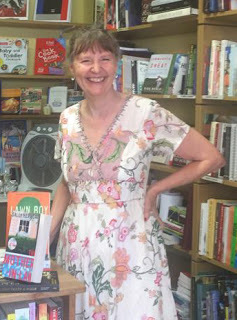 I’ve always loved the Tudor period, from a very early age, have a degree in medieval history. I’ve lived in six different countries in my life and soaked up the history in each one. I now live in France which made writing about three different countries and cultures easier for me. I’ve always worked with words wherever I’ve lived: teaching, editing, writing.
I’ve always loved the Tudor period, from a very early age, have a degree in medieval history. I’ve lived in six different countries in my life and soaked up the history in each one. I now live in France which made writing about three different countries and cultures easier for me. I’ve always worked with words wherever I’ve lived: teaching, editing, writing. I’m married with three sons so plenty of scope for Nicolas and Tristan! Anne Boleyn was the only character I found slightly elusive. All the others were so vivid, I had no problem getting into their heads. Of the kings, James was my favourite and after all my reading I hope I did him justice. All were brilliant men. Renaissance men, so cultured. What would they make of ours today? Harry could easily pass for Henry’s naughty little brother. Not sure Charles would make the grade.
Connect with Vivienne: Website • Blog • Goodreads.
Published on January 09, 2020 20:00
Check out Jim Adameit's fabulous #NewRelease — The Definition of Experience: Inside the Contract Electronics Manufacturing Services Industry #Thriller @JimAdameit

The Definition of Experience:Inside the Contract Electronics Manufacturing Services IndustryBy Jim Adameit

One Man's Stand Against The Corporate Machine. An edgy, racy, action-packed business / financial / technology thriller, about the global industry that manufactures and brings us all our smart phones, laptop computers, cloud servers - and virtually any other electronics products you can think of.
This industry is known as Contract Manufacturing, or Electronics Manufacturing Services - which employs hundreds of thousands of people around the world. It could be the largest industry that most people have never heard of. And you’d be surprised what really goes on there.
Think this is boring stuff? In a US $500 billion-dollar global market - with careers, and THAT much money at stake? Think again...
Excerpt

Milton Raynor rubbed his eyes with both forefingers, his coke-bottle thick black frame glasses moving up and down on his face as he did. Both eyes were now dry and burning from over twelve hours of non-stop use. He’d gone back and forth between the two 24” workstation displays in front of him, the C and D sized plotted drawings taped to his cubicle walls, the product specs and bills of materials strewn on his desk, and various electronic component catalogues on his side table. Ordinarily he would have left the office after eight hours, nine hours max. His eyes and his ass usually well tired enough by then to stop for the day.
But these were especially stressful times, and they called for extraordinary efforts. And besides, he had a deadline to meet. A very critical deadline. One that couldn’t be missed. Milt slid his chair back and stood, grabbed the top of his blue ceramic coffee mug with spread fingers, and walked a few hallways over to the break room. Along the way, he tapped his college class ring on the ceramic, making a clinking sound. Purdue University, College of Engineering. A nervous habit he had. It wasn’t unheard of for design engineers to work late and put in extra hours from time to time. But he was on a special mission. Milt got to the break room closest to his cubicle, put his mug under the Keurig, selected a k-cup of high octane dark Sumatra coffee and got his refill. After a couple of splashes of powdered creamer he squeezed from the canister, which he swished around in his cup now holding it by the handle, he was back in business again. Or almost so. He took a careful sip trying not to burn his tongue, and then started on his way back to his cube. He passed one of the janitors vacuuming the dark industrial carpeting that ran through the design wing.
Each wing had different colored cubicle walls, so if one was lost in the nearly half million square foot building, all you’d have to do is look over at the partition colors to figure out roughly where you were, then follow the ROYGBIV sequence back to where you needed to be. The standing joke was that red was chosen for the engineering area so the blood stains from over-worked engineers wouldn’t show on the walls. Any employees who happened to be color blind, had a particular challenge though.
Milt made it back to his desk just in time to hear his cell phone ring. He carefully put down his coffee, shuffled some papers off of several stacks, tracing the source of the rings to uncover his buried iphone. He pushed the button to connect. His finger nails were bitten back halfway to the cuticle. “Milt?” “Yes, this is he”, as it then occurred to him who the voice was on the other end. Milt pulled his chair over and sat down slowly. “I need a status report from you”, the man said. He didn’t need to identify himself, Milt knew who he was.
“I have your schedule right in front of me. Let’s go over where you are. D-Day is in three weeks. I certainly hope you’re going to tell me you’re on plan and won’t miss that date. But don’t ever lie to me. Bad things happen when people lie to me.” Milt felt his heart pounding, now faster and stronger than usual. He was clear about D-Day, D for delivery… when all his design deliverables were due. Milt took a deep breath, and chose his words carefully. He began to speak, slowly at first, then faster, like he’d taken a bottle full of speed and they’d just kicked in. “I’m at work, and on schedule, I’ll make the deadline”, Milt said, his voice beginning to stutter a little. “Good to hear”, the man said. “You know what arrangements to make when you’re done, right?” “Yes. Yes, I know what to do when I’m done with this project”, Milt said. “Fine then, I’ll let you get back to work. I’ll check on you again soon. Don’t miss your deadline”, then the man ended the call before Milt could say anything else.
He stared at the phone for a few beats, making sure the caller had indeed gone. Milt dropped his phone on his desk and sat in his chair for a few minutes, slowly leaning his head back on an imaginary head rest with his eyes closed, trying to slow down his breathing. He felt his the back of his neck get clammy. He tried to do some self-talk that his therapist taught him, to calm himself down when he was feeling panicked. That alone wasn’t going to do it though. After a few minutes with insufficient results, Milt reached into his middle desk drawer. The one against the left side cubicle wall, pushing random pieces of paper aside to get to the back of the drawer. Then he stopped, and stood up, craning his head all around to see if anyone was nearby.
Satisfied he had no unplanned visitors or other interlopers, Milt sat back down and reached into the desk again. He felt with his left hand for the small metal divider that portioned off the very back part of that drawer. He then pulled the divider forward, which he’d rigged with two springs on swivel pins attached to the drawer, so it’d move back and forth like a small door for easy access, to hide the back compartment. Milt reached in further, and pulled out one of two plastic green Mountain Dew bottles he had hidden back there. He quickly screwed off the lime green cap and poured the equivalent of two shots into his coffee cup. But it wasn’t the yellow green of Mountain Dew. It was the amber brown of Maker’s Mark. He carefully put the cap back on, making sure not to cross thread the cap onto the bottle, and reversed his procedure, stowing the bottle back into its hiding place, until the next time Milt needed it. That might be a few minutes from now, or might be in an hour, but he knew he’d need it again before too long. Meditation and self-talk only did so much.
The Definition of Experience is only 0.99 on Kindle for a LIMITED TIMEAmazon UK • Amazon US
Jim Adameit
 Jim Adameit is the author of 'The Definition of Experience', his debut ‘corporate noir’ / technology thriller novel. Jim is a 30+ year veteran of the Contract Manufacturing / Electronic Manufacturing Services (CM/EMS) Industry – an industry sometimes controversial, and always extremely competitive. He’s held global positions in project management, sales and marketing, and manufacturing operations. Jim’s confident those in the CM/EMS industry will easily relate to the business aspects, terminology, and drama - and hopeful that others unfamiliar will find this a fascinating and insightful journey into new world. Think early business thrillers from Joseph Finder - ‘Company Man’, ‘Paranoia’, ‘Power Play’ - meets Michael Crichton’s ‘Disclosure’.
Jim Adameit is the author of 'The Definition of Experience', his debut ‘corporate noir’ / technology thriller novel. Jim is a 30+ year veteran of the Contract Manufacturing / Electronic Manufacturing Services (CM/EMS) Industry – an industry sometimes controversial, and always extremely competitive. He’s held global positions in project management, sales and marketing, and manufacturing operations. Jim’s confident those in the CM/EMS industry will easily relate to the business aspects, terminology, and drama - and hopeful that others unfamiliar will find this a fascinating and insightful journey into new world. Think early business thrillers from Joseph Finder - ‘Company Man’, ‘Paranoia’, ‘Power Play’ - meets Michael Crichton’s ‘Disclosure’. Jim’s been described as “…the Tom Clancy of corporate techno-thrillers – delightfully complex and wildly entertaining.”
He’s now writing his second novel, the sequel to this one, entitled ‘The Definition of a Secret’.
(PS - the electronic device on which you're reading this, was made by a company in this industry!)
Connect with Jim: Website • Twitter • Goodreads.
Published on January 09, 2020 19:30
January 8, 2020
#BookReview — A Flame Through Eternity: The Wanderer Series #3 by Anna Belfrage #TimeSlip #Erotica @abelfrageauthor
 A Flame Through EternityThe Wanderer Series #3By Anna Belfrage
A Flame Through EternityThe Wanderer Series #3By Anna Belfrage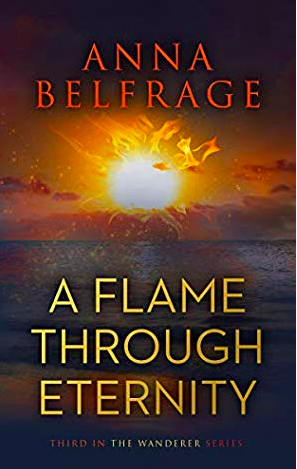
It started 3,000 years ago. It ends now. Who survives?
Helle may believe in second-chance love, but she sure doesn’t believe in reincarnation. Okay, she didn’t believe in stuff like that until she met Jason Morris a year or so ago. By now, she has accepted that sometimes impossible things are quite, quite possible—like an ancient princess being reborn as an ambitious financial analyst.
Finding Jason was like finding the part of her that had always been missing—a perfect match. But handling Sam Woolf, the reborn version of their ancient nemesis is something of a trial. No sooner do you have him well and surely beat, but up he bounces again. Sheesh, will it take an oak stake to permanently rid their lives of him?
Sam Woolf is a powerful adversary. Too powerful, even. Jason and Helle will need help from unexpected quarters to finally bring this tangled, ancient love-and-hate triangle to some sort of conclusion. Question is, will they survive the experience?

“It isn’t over yet. He’s not gone. He’s back. And this time he intends to win...”
After 3,000 years you would think that Samion, Prince of Kolchis, would give up. But there was darkness in his soul, a cruel evil. He wanted Helle. He wanted to own her, possess her, dominate her. He would beat her into submission if he had to. But in this life, he would be victorious, and he would get what he thinks he deserved.
Trapped in an endless cycle of reincarnation, Helle Morris knew only this, that her life meant nothing without Jason by her side. He was the first and only man she had ever or would ever love. But she could not shake off this terrible feeling that Sam Woolf (Samion) was still lurking in the shadows, waiting — waiting for her.
Jason Morris was under no illusion that Woolf was still alive, and he would come for Helle. It was just a matter of time. However, Jason was determined that he and Helle would have the life that had been so cruelly denied them until now, and he would do everything in his power to destroy Woolf once and for all.
From the protected comforts of Tor Cottage, that stands in the shadows of the mystical Glastonbury Tor, to a heartbreakingly life-changing confession in the place where it all began, A Flame Through Eternity: The Wanderer Series #3 by Anna Belfrage is the dramatic conclusion to a story that spans three turbulent millennia.
Knowing how Belfrage summons every emotion conceivable from her readers, I came prepared with a box of Kleenex. It was a wise decision! This book made me cry, it made me laugh, it made me grimace, it made me cry again, but it left me with a smile on my face and hope in my heart. What more could you ask for in a book?
I have waited with eager anticipation for the final chapter in what has been the utterly mesmerising story of Jason and Helle as they battled not only to stay alive but to stay together. This is a novel like no other. It is a story of ancient souls, and an unquenchable and undeniable love that would not be shaken and nor would it be denied. These characters, this setting, and this narrative are as enthralling as they are unforgettable.
Oh, this series! It captured my attention from Book #1 and did not let me go until that final heart-warming sentence. It is a story of violence, hate, bitter rivalry, fear, betrayal, regret, but above everything else, it is a story about love. And what a love story it is. Helle and Jason’s romance is the kind that makes a reader swoon, and I was desperate for them to have that happy ending, and for a terrible moment, I wondered if Belfrage was going to be incredibly cruel and not give it to them. The tension was almost unbearable because the antagonist was just so terrifying.
Woolf is a powerful and wicked man who corrupts everything he touches. He is the kind of villain that even hardened criminals would submit to. Woolf is a terrifying antagonist and one I really loathed. His power is so immense it seemed the only way Jason and Helle would be safe is if they died, but of course, their fight to be together would start again in the next life. If, they did not vanquish Woolf, now, they would never know peace. This compelling portrayal was played out with an elegant turn of phrase and a riveting narrative which made this book next to impossible to put down.
There is a cast of wonderful supporting characters in this book, but Nefirie the Wanderer who was Jason’s mother in his first life was a character that really drove the story in this book forward. There are a lot of terrible revelations which change the perception that I had of Nefirie at the beginning of the series. Nefirie is a very powerful old soul, but her reaction and her treatment of Helle meant that although at times I sympathised with her, I could not like her, try as I might. She is very manipulative, very possessive, and there were many similarities between Nefirie and Woolfe, which were very unsettling. I think Belfrage has depicted Nefirie with a great deal of skill and care. Belfrage gives us an understanding of why the characters act like they do and make the choices that they make as well, which was incredibly insightful and certainly helped to move the story forward.
I have to mention Korine. I simply adored Korine — who is Helle’s and Jason’s daughter from their first life. She is such a sweetheart, who has the gifts of both her father and her grandmother, but because of this, she knows things, and she sees things that she should be oblivious to. Her life is one of emotional torment, but also determination. Korine is determined that her parents will find peace with each other, and she will do everything in her power to help them. I thought Korine’s depiction was fabulous. I loved everything about her.
Lastly, I have to mention Helle and Jason. These two characters irrevocably stole my heart. The love that they share, the devotion and the desire to live a normal life together is irresistible. Belfrage certainly knows how to make characters that her readers can care about.
Belfrage is an author that keeps giving. I am never disappointed by her books, they just get better and better, and this series is another example of how much of a master, Belfrage is at her craft. Her attention to detail, her ability to conjure a scene with such animation and imagination is a real treat for any reader, and her lucid understanding of human nature makes her characters not only real in the telling, but relatable, especially with regards to Jason and Helle’s relationship — for most of this series they are living in fear, but there are also moments when they get annoyed with each other, as happens in any normal healthy relationship. I thought that made them really compelling and far more importantly, believable.
I cannot praise this series enough. It is in all ways a triumph, and it is one that I have enjoyed immensely.
If you are looking for your next great time-slip adventure, then stop searching for you have found it. The Wanderer Series is deserving of your time, and Belfrage is an author that demands your respect.
I Highly Recommended.
Review by Mary Anne Yarde.The Coffee Pot Book Club.
Pick up your copy ofA Flame Through EternityAmazon UK • Amazon US
Anna Belfrage
 Had Anna been allowed to choose, she’d have become a time-traveller. As this was impossible, she became a financial professional with two absorbing interests: history and writing. Anna has authored the acclaimed time travelling series The Graham Saga, set in 17th century Scotland and Maryland, as well as the equally acclaimed medieval series The King’s Greatest Enemy which is set in 14th century England. She has recently released the first in a new series, The Wanderer. This time, she steps out of her normal historical context and A Torch in His Heart is with a fast-paced contemporary romantic suspense with paranormal and time-slip ingredients.
Had Anna been allowed to choose, she’d have become a time-traveller. As this was impossible, she became a financial professional with two absorbing interests: history and writing. Anna has authored the acclaimed time travelling series The Graham Saga, set in 17th century Scotland and Maryland, as well as the equally acclaimed medieval series The King’s Greatest Enemy which is set in 14th century England. She has recently released the first in a new series, The Wanderer. This time, she steps out of her normal historical context and A Torch in His Heart is with a fast-paced contemporary romantic suspense with paranormal and time-slip ingredients.Find out more about Anna by visiting her website, or herAmazon page.
Published on January 08, 2020 21:00
Join #HistoricalFiction author, Amy Maroney, as she takes a look at The Legendary Island of Rhodes #History #Legends @wilaroney
The Legendary Island of Rhodes By Amy Maroney
I was lucky enough to visit the Greek island of Rhodes for several weeks back in 2012, and I’ve been thinking about how to incorporate it into my fiction ever since. As luck would have it, my next historical mystery series stars a medieval heroine born in Rhodes, so I am happily immersed in the island’s lore once again.
This jewel of the Mediterranean might be best known for the Colossus of Rhodes, a giant statue that reportedly stood at the harbor of Rhodes city in ancient times but was destroyed by an earthquake. Whether the colossus existed or not, the fact remains that this harbor city has an illustrious history of maritime trade stretching back for millennia. I can testify that the city harbor is still awe-inspiring even without a gigantic bronze man looming over its exquisitely preserved medieval seawalls and stone quays.
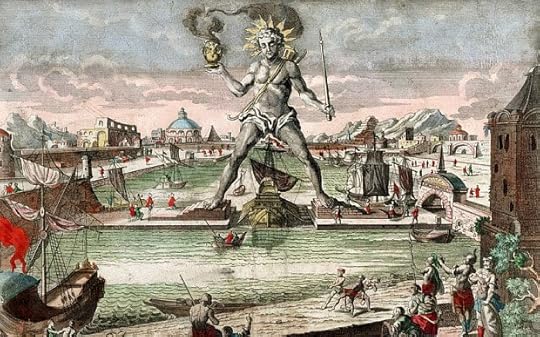
One of the things that made a big impression on me during my time there was the reconstructed palace of the European Knights Hospitaller in the city of Rhodes. When I visited, I was particularly struck by the sight of random stone markers carved with forgotten knights’ coats-of-arms, leaning haphazardly against the walls in shadowy recesses of the palace. These vestiges of European knights seemed bizarrely out of place amongst the ruins of ancient Greece that dominated the island.
Upon further inquiry, I learned the island’s strategic location just ten miles from the coast of Asia means it has always been a point of contact between cultures. As the Ottoman Empire expanded its territories during medieval times, Rhodes’ significance as the last bastion of Christendom grew. During the 14th-16th centuries, the island became the easternmost outpost of the Knights Hospitaller, who fortified the walls of the city, built a palace, and developed a highly efficient naval empire. Their fleet—operated mostly by mercenary crewmen—defended Rhodes from attacks by Turkish forces and Barbary pirates. The knights also launched countless pirate attacks of their own on coastal areas held by the Ottoman Empire, enslaving Muslims who became a critical labor force for them back in Rhodes city.
The Turks attacked Rhodes twice during the rule of the Knights Hospitaller. The first siege, mounted in 1480, was a failure—though it caused much destruction and loss of life on both sides. An eyewitness account of the siege written by a knight named Guillaume Caoursin became an instant bestseller thanks to the proliferation of the new printer press technology throughout Europe. While I plan to study Caoursin’s account, I’ve learned that it was written with the goal of drumming up more revenue for the Knights Hospitaller and was a carefully orchestrated bit of propaganda. Not long after that first siege, an earthquake struck Rhodes and destroyed much of the city. The Knights undertook massive renovations, but just a few years later the plague struck. After struggling to rebuild once again, the city found itself a target of the Ottoman Empire for a second time in 1522, and this siege was victorious. The Knights were forced to relocate permanently to the island of Malta after surrendering to Suleiman the Magnificent of Turkey. (Add photo of Rhodes medieval illustration)
I’m always looking for primary sources, accounts by real people that describe life during medieval and early Renaissance times. Not much survives from those eras, let alone first-person documents that give us a window into peoples’ personal worlds. A happy exception is the journal of Michael of Rhodes. Michael was a Greek man who became fluent in Italian thanks to the Latin influence of nobles, merchants, and artisans who lived and worked in Rhodes city. He began working as a humble oarsman in 1401 and rose through the ranks to eventually command ships for the Venetian merchant fleet, sailing extensively on the Mediterranean and Atlantic over the next forty or so years. He chronicled his navigational knowledge, plus treatises on shipbuilding, mathematics, and some personal details of his life in a series of hand-written and illustrated documents, the contents of which were hidden in private libraries for centuries. Luckily for research geeks like myself, the owner of Michael’s journals allowed researchers to study these documents extensively about ten years ago. Although I borrow most scholarly works through Interlibrary Loan, I couldn’t resist adding Michael’s story to my personal library, and I am waiting impatiently for my copy to appear via snail mail. [Add photo of Michael’s ship illustration]
While I eagerly seek out factual first-person accounts in my research, I’m also partial to myths. One of the island’s best-loved legends recounts the tale of the dragon of Rhodes, which was slain in the 14th century by a knight who cleverly determined that the beast’s weak link was his soft underbelly. After stabbing the dragon in the gut and killing it, he displayed the fearsome head on the walls of the city for all to see. Reportedly, the head stayed up there until the 1800s and numerous eyewitnesses corroborate its existence. One theory circulated today is that the creature was in fact a crocodile brought to the island via a ship, which grew into a monstrous beast that could easily be mistaken for a dragon. Supposedly the knight who killed it was laid to rest in a tomb inscribed with the words: “Here lies the dragon slayer.”
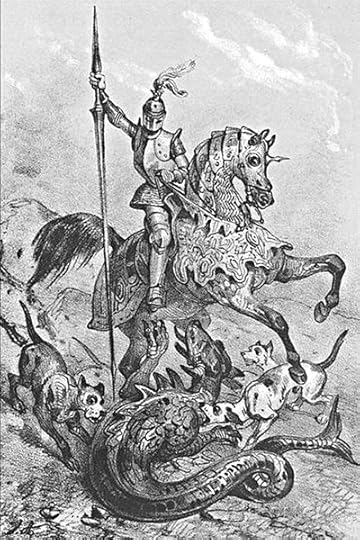
Clearly I’ve already discovered a rich array of lore for Book 1 of my next series. Now the trick is to learn when to stop researching and start writing. After all, each rabbit hole leads to another one that seems even more pivotal than the last. For me, research is a hugely satisfying part of writing historical fiction—the process of learning, making connections, and sparking creative inspiration. Once I have layers of facts, myths, and first-person accounts in place, I can engineer my story with confidence. And as a magical bonus, I get to revisit places like Rhodes—only this time as an armchair adventurista.
A Place in the World
(The Miramonde Series, Book 3) By Amy Maroney

The secrets of the past are treacherous…and irresistible.
A Renaissance-era female artist and an American scholar. Linked by a centuries-old mystery…
1505: Pregnant and reunited with the love of her life, artist Mira survives a harrowing journey to the city of her dreams. But Bayonne is nothing like she imagined. Navigating a dangerous world ruled by merchants and bishops, she struggles to reignite her painting career. When an old enemy rises from the shadows, Mira’s life is thrown into chaos all over again—and she is faced with a shattering decision.
2016: Scholar Zari seizes the chance to return to Europe as a consultant for an art dealer. Overwhelmed by her job, she has little time to hunt for clues about Mira. But when art experts embrace a theory that Mira’s paintings are the work of a famous man, Zari must act. Racing against time, she travels to a windswept corner of Spain. What she discovers there solves the puzzle of Mira forever—and unlocks the secrets of Zari’s own past.
A thrilling tale of obsession, mystery, and intrigue, this mesmerizing saga will stay with you long after you read the last page.
Excerpt
Autumn, 1506Lourdes, Béarn
Mira stood in the center of the entry hall, her head throbbing. The clatter of crockery rang out from the kitchens, but the innkeeper was nowhere in sight. Nor were any servants. In fact, the only sign of life was a tawny cat curled on its haunches by the doorway.
She and the cat stared at each other. Its eyes looked remarkably like her own. Gray-green, wide, slanted up at the corners. She took a deep breath, then regretted it. The stale air smelled of tallow and boiled cabbage.
Outside, a rooster crowed.
Mira went to the door and nudged it open, desperate for a distraction from the sour taste in her mouth. The cat slunk past her skirts and padded into the bright morning sunlight. It stopped for a moment, taking the measure of the courtyard, then sauntered toward three chickens pecking at grain near the stables. At its approach, they sidled nervously away.
Wise chickens, Mira thought. You never know what a cat will do.
Two merchants descended the stairs behind her, their boots heavy on the treads. Mira moved into the shadows as they strode through the entry hall and out the door. She had become adept at slipping through the world unnoticed since this journey began. The habit did not come naturally to her. But as a woman traveling alone, her life depended on it.
A Place in the World is available for purchase from Amazon, Kobo, iBooks, and Nook.
Amy Maroney
 Amy Maroney lives in the Pacific Northwest with her family. She spent many years as a writer and editor of nonfiction before turning her hand to historical fiction. She’s currently obsessed with pursuing forgotten women artists through the shadows of history. When she’s not diving down research rabbit holes, she enjoys hiking, drawing, dancing, traveling, and reading. She’s the author of the Miramonde Series. To receive a free prequel novella to the series, join Amy’s readers’ group at www.amymaroney.com. You can find her on Twitter @wilaroney, on Instagram @amymaroneywrites
Amy Maroney lives in the Pacific Northwest with her family. She spent many years as a writer and editor of nonfiction before turning her hand to historical fiction. She’s currently obsessed with pursuing forgotten women artists through the shadows of history. When she’s not diving down research rabbit holes, she enjoys hiking, drawing, dancing, traveling, and reading. She’s the author of the Miramonde Series. To receive a free prequel novella to the series, join Amy’s readers’ group at www.amymaroney.com. You can find her on Twitter @wilaroney, on Instagram @amymaroneywrites
Published on January 08, 2020 20:00
January 7, 2020
#BookReview — Fortune’s Child: A Novel of Empress Theodora by James Conroyd Martin #HistoricalFiction @JConMartin
 Fortune’s Child:A Novel of Empress TheodoraBy James Conroyd Martin
Fortune’s Child:A Novel of Empress TheodoraBy James Conroyd Martin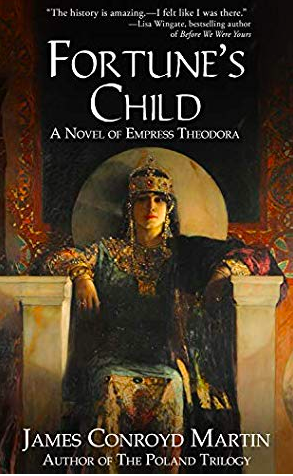
From a very young age, Theodora, daughter of a circus bearkeeper in Constantinople, sets her sights well above her station in life. Her exquisite beauty sets her apart on stages and in the eyes of men.
Stephen, a Syrian lad of striking good looks, is sold by his parents to a Persian wizard, who teaches him a skill in languages that will serve him well.
By the time Destiny brings them together in Antioch, Theodora has undergone heart-rending trials and a transformation, while Stephen has been sold again . . . and castrated.
Discover the enduring bond that, however imperfect, prompts Theodora—as Empress—to request palace eunuch Stephen to write her biography.

“But to take revenge on a dying woman—an empress forged in steel, nonetheless—would demand cold determination and a cunning mind. I vow to meet the challenge.”
For five long years, Stephen has suffered the indignity and inhumanity of a cold, damp prison cell. When they come for him, he fears the worst. But instead of death, he is given an audience with the woman who had sealed his fate all those years ago.
How can Empress Theodora ask this of him? After everything, she has done. And yet, Stephen is the only person she can trust to write her official biography. How Stephen would like to throw Theodora’s offer in her face, but he has already lost five years of his life, he does not want to lose anymore.
But as Theodora begins to recite the story that she wants him to tell, Stephen cannot help but remember his own dark and sordid journey from a young Syrian boy to a palace eunuch.
From the abject terror of a key turning in a dungeon door to the remembered past of a life once lived, Fortune’s Child: A Novel of Empress Theodora by James Conroyd Martin, is the compelling account of the rise to power of Theodora and the man who loved her from afar.
With crystalline prose, Martin has written a book that horrifies, fascinates, and moves in almost equal measures. The life of Empress Theodora is one of debauchery and passionate interludes. It is also the story of a woman who escaped the poverty of her birth and rose in station so high it surpassed all expectation. Theodora is an actress, a whore, a mother, a mistress, a wife, and finally an empress. Martin has brought Theodora vividly back to life in the pages of this remarkable book.
With a keen eye on the historical controversy, Martin has presented his readers with a book that is backed by confident research, and his almost lyrical narrative made Fortune’s Child next to impossible to put down. The hours of research that Martin has dedicated to the life of Theodora has to be commended. Martin presents his readers with a woman who is intelligent, sensual, and determined. Theodora's story is quite extraordinary and, as is suggested in this book, her character has been cruelly assassinated by those who loathed her power and position. Martin has decided to base his Theodora not on the seemingly bitter, or perhaps self-seeking exaggerations of Procopius of Caesarea, but on his own understanding of her character. However, Martin does not give his readers a Theodora without the controversy, but he does allow his readers to glimpse or more balanced view of her. I thought his depiction was particularly well-drawn, and more importantly, believable. Fortune’s Child is indeed a dazzling portrait and a gripping account of Theodora’s life and that of the Byzantine Empire during this time.
Fortune’s Child is the story of Theodora’s rise to power, but it is also the gripping, yet haunting tale of the former Secretary to the Empress — Stephen. Stephen’s story is unforgettably tragic. His hopes, his dreams, his desires are stolen from him as surely as his freedom was. Stephen suffers terribly in this book, and at times, the things he is made to endure left me in tears. His story is one of survival, and what a story it is. Stephen is betrayed at first because of his family's poverty, and then by Theodora, whom he adored and trusted. His story is genuinely heart-rendering, and I think it is one that will haunt me for a long time.
Martin writes with a great deal of authority, but he also has a keen eye on human fragility and frailty. His characters are flawed, but not ridiculously so. They come across as very authentic and real in the telling. Martin also writes with a great deal of imagination and a seemingly inexhaustible supply of energy, which not only made this book incredibly gripping but also vastly entertaining. Martin has a novelist intuition for what makes a book immensely readable as well as creating characters that a reader can really get behind. When historical fiction is written in such a way, there is no such thing as too much.
Fortune’s Child: A Novel of Empress Theodora is a book that is compelling, engaging, and utterly engrossing. It is a book where history comes alive. This is a book worthy of your time and deserving of a place on your bookcase.
If you are looking for your next great Historical Fiction read, then look no further than Fortune’s Child: A Novel of Empress Theodora by James Conroyd Martin. I, for one, cannot wait to read the next book in what promises to be the next great series.
I Highly Recommend.
Review by Mary Anne Yarde.The Coffee Pot Book Club.
Pick up your copy ofFortune’s ChildAmazon UK • Amazon US
James Conroyd Martin
 Ah, Fate~
Ah, Fate~The seed for "Fortune's Child" started some years ago when I was taking an Art Appreciation course at a community college in Los Angeles. One day we were studying the exquisite mosaics of Emperor Justinian and Empress Theodora from the Basilica di San Vitale in Ravenna, Italy, and the professor pointed to Theodora and said, “I’m not a writer, but if I were, that is the woman I would write about.”
Little did he know what he had unloosed.
What a fascinating woman, frailties and all! She could have been the prototype for Eva Peron. I started the novel right then and there; however, life and other books got in the way.
But Fortune's Child has finally found her way.
Fate goes ever as it must.
I am also the author of THE POLAND TRILOGY, beginning with "Push Not the River," a novel based on the diary of Anna Berezowska, a Polish countess who lived through the rise and fall of the Third of May Constitution. After working on the project for some years without raising interest within the publishing community, I self-published in 2001. Just one year later, St. Martin’s Press purchased the book and released a hard cover edition in September 2003. Polish and German rights sold almost immediately.
The Polish edition, "Nie ponaglaj rzeki," was released in May of 2005, became a bestseller and sold out in a matter of months. Anna's story had come full circle: Polish to English to Polish! "Pod purpurowym niebem," the translation of "Against a Crimson Sky," also became a bestseller when published in December of 2007.
"The Warsaw Conspiracy" followed, as did "The Boy Who Wanted Wings."
Martin, who holds degrees from St. Ambrose and DePaul Universities, is a retired English and Creative Writing teacher now living and writing in Portland, Oregon.
Connect with James: Website • Twitter • Goodreads.
Published on January 07, 2020 21:00
Join me in Conversation with #HistoricalFiction author, Jan Selbourne #amwriting #WW1 @JanSelbourne
A Conversation with Historical Fiction author, Jan Selbourne
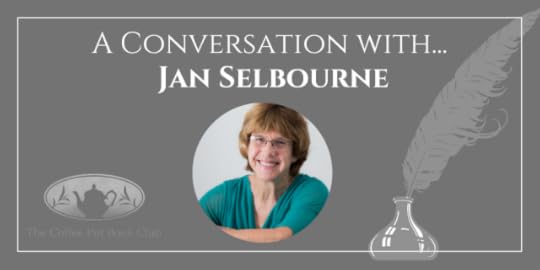
MA: Please give a warm Coffee Pot Welcome to Historical Fiction author, Jan Selbourne.
 JS:Hello Mary Anne, thank you for inviting me to your guest blog. I’m Jan Selbourne, and I live in New South Wales, Australia.
JS:Hello Mary Anne, thank you for inviting me to your guest blog. I’m Jan Selbourne, and I live in New South Wales, Australia.MA: Hi Jan, it is so lovely that you could spare the time to chat with us today. Can you tell my readers what inspired you to write Behind the Clouds?
JS: The urge to write books had been with me since schooldays, but something always pushed it onto the backburner, like career, marriage and family. When I finally retired and ready to start - fingers poised over the keyboard - I had no idea what to write about. It was by chance that I read a very interesting article on how a person’s true character emerges when faced with life-threatening danger or extreme stress. For example, the tough he-man turns to water and runs, the mild, unassuming person steps up and takes control. The story began to form in my head.
MA: It always amazes me how inspiration strikes. How did you come up with your setting, and your characters?
JS: During World War One my grandfather served with the Australian Imperial Forces in Belgium and France. His war service papers tell us he was in some of the worst battles, but it took years for him to talk about how terrible it really was. I began researching the chain of events leading up to the German invasion of Belgium in August 1914, and what followed in that country was called The Rape of Belgium. There in front of me were the appalling atrocities my grandfather spoke about. I had my setting.
Adrian and Gabrielle Bryce are both products of upper-class Victorian and Edwardian England and as such, expected to ‘marry well’. Eight years of marriage and two children later, they can barely stand the sight of each other – until they travel to Belgium. Despite the political upheaval following the assassination of an Austrian archduke, Belgium was firmly neutral until the Germans crossed the border intent on surrounding France. Twenty- four hours later a shocking betrayal and murder have Adrian and Gabrielle running for their lives.
MA: So many brave men never spoke of what they saw during the war. It is truly humbling to think of their sacrifice.
There are many books in the historical fiction genre. Can you tell us three things that set your novel apart?
JS: There are many wonderful books in the historical fiction genre. With my books –
I wanted my characters to be real people with flaws, who make mistakes and must live with the consequences, as we all do. In Behind the Clouds, Adrian Bryce is an arrogant snob who has wealth, a beautiful mistress and a secret life. His neglected wife Gabrielle, whom he considers plain and boring and their two children live well out of the way at their country home. It all comes back to bite him when his mistress is instrumental in accusing him of treason and, trapped in Belgium he’s forced to rely on his wife’s ingenuity, courage and language skills for his very survival.
My three books, Behind the Clouds, Lies of Gold and The Proposition include my characters’ children because they play a big part in decisions, loyalties and obligations.
Research, because historical novels demand an accurate as possible background of the era warts and all - the social customs, value of money, travel, class distinctions, marriage laws, etc. For example, the Regency era was a renaissance of architecture, fashion, music and art. Beneath the gloss was a rigid class structure, appalling poverty and a brutal penal system.
MA: Your book sounds fabulous. One last question… Can you tell us what you are currently working on?
JS:My book in progress is set in the 1770s, where arranged marriages were considered normal and acceptable except for Sarah Forsythe who is betrothed to a man twice her age. Repulsed but scared of her father, Sarah runs away from her privileged life with the son of a Methodist minister. Not to Gretna Green, but the New World. A new world of broken promises, abandonment and downward spiral into degradation. The American colonies are rebelling against British rule, the siege of Boston worsens and at her lowest point Sarah finds a hidden box. Desperate for money she steals it only to discover a bundle of documents. Bank of England documents. Sarah manages to join General Howe’s evacuation to Nova Scotia and by lying in her teeth, secures passage back to England unaware two men are following intent on claiming ownership of those documents at any price.
MA: Thank you, Jan, for stopping by and chatting with me today.
Scroll down to find out more about Jan’s fabulous book — Behind the Clouds
Behind the CloudsBy Jan Selbourne

Barely tolerating each other, Adrian and Gabrielle Bryce are trapped in Belgium as the clouds of war loom over Europe. Plunged into a nightmare of lies and betrayal they flee for their lives as the German forces cross the border. Narrowly avoiding capture, witnessing death and atrocities, they reach safety as two different people – only to face charges of treason and a woman who’ll stop at nothing to see Adrian dead.
Excerpt
He’d barely slept because of his throbbing foot, and he was as thirsty as hell. Hobbling to the canal he drank the murky liquid thirstily, then dipped both his feet into the cold water. He let out a slow sigh as cool water soothed his aching extremities.
Gabrielle knelt at the water’s edge beside him to wash her face and push her wet fingers through her hair to slick down the untidy curls. Her voice was low and angry.
“What was she like?”
“What are you talking about?” He scowled, dreading what was coming.
“Sigrid, Maryanne, whatever her name was,” she snapped back.
“What the hell are you trying to do, Gaby? Force an argument?”
“No, I’m not forcing an argument. I really want to know! You preferred that woman’s company to mine and your children’s and, because of her and my uncle and your unbelievable stupidity, two innocent people have died, and we are forced to rely on each other to stay alive. Are you proud of yourself? And was her beauty and obvious bedroom expertise worth all of this?”
Adrian clenched his jaw and turned his head away, angry and embarrassed.
“I’m waiting,” she persisted. “I presume you also showered her with gifts and expensive baubles while we would be lucky to see you on our birthdays.”
Something snapped inside him. His face was tight with fury as he turned back to face her. “If I could get up and walk away, I would. Just what are you trying to achieve? We’ve avoided capture by the skin of our teeth, we have no idea how to get away, the Germans are pouring into Belgium, thousands will be killed, and you want to know if I showered her with gifts. Why don’t we concentrate on getting out of here and then you will be free of me? Now, for Christ’s sake, leave it alone.”
“You want to get up and walk away?” her voice dripped scorn. “Did I walk away from that lonely, empty life, in that big, lonely house? Making excuses to your children, visiting neighbours on my own. Did I show such contempt for my marriage vows?”
“You forgot to mention entertaining Charlton in my home,” he snarled, and then flinched as Gabrielle’s hand slapped his face.
“Yes, your home.” she yelled. “I may have lived there and given birth to your children there, but it was always your home. I pray to God we will return to England and you can enjoy your home with your expensive, treacherous harlots!” Her hands clenched into fists. “Yes! Brian did share my bed. You were never there; you couldn’t care less about me or our children. You were so besotted with that German harlot’s devious charms you had no idea what was going on. She was exceptionally clever, and you were exceptionally stupid.”
Adrian rubbed his cheek and pointed his finger at her. “If you hit me again, you will be sorry. You want to know what she was like. I’ll tell you… She had long wavy auburn hair, a figure that made men’s eyes water and, yes, she had expertise in the bedroom. She could drink me under the table, and she could discuss politics like a man. She was exceptionally clever and, yes, you are right, I was exceptionally stupid, because I hadn’t a clue she was German or she’d bedded a cabinet minister or she’d been on other assignments for your uncle. I hope I’ve answered all your questions and I don’t give a damn whether you believe me or not, but I’m bloody ashamed of myself. And I hope to God we’ll get back to England, so you can do whatever you want, and I won’t have to listen to your harping sarcastic tongue. Are you happy now?”
“Oh yes, very happy, thank you. Who wouldn’t be, sitting with you on the damp ground beside a canal without food or clean clothes,” her eyes glittered with contempt. “How does it feel that you, a cabinet minister and my uncle shared her? I wonder if she kept an inventory of her jewellery and gifts to remember who gave her what.”
He pulled his feet from the water and stood up. “I’m not listening to your ranting anymore, nor am I waiting here for them to find me.”
“You can’t face the truth, can you?” she shouted at him. “Well, unpleasant as it is, you need me and I need you to survive. When we reach safety, you can go back to the life you enjoyed with your sophisticated women without the inconvenience of an unwanted wife. And if we get out of here, I don’t want anything from you. Not even a Christmas card.” Her lip curled. “A gentleman never breaks a business contract, but it’s of no consequence to break your marriage vows.”
Adrian reached down and roughly pulled her up to face him, his eyes black with fury. “I can’t face the truth? It’s a pity you didn’t meet and marry that useless fop Charlton eight years ago, because he’d have been the target for your sainted uncle’s lunacy instead of me! Christ, you haven’t shut up about your miserable marriage, but look where it’s got me! Stitched up like a bloody weaver’s loom, set up as a traitor, hiding like a fugitive. And why? Because I had the temerity to marry you!” He turned his back and hobbled over to the grazing horse. “I’m leaving; are you coming with me or staying here?”
Gabrielle’s face mirrored the shock she felt at Adrian’s words. Her foot lashed out sending a small log into the water and she walked up to Adrian, her fists clenched, then without warning she burst into tears. “I have no choice.” Her voice was raw with emotion. “All I want is to get out of Belgium and go back to my children and never see you again!”
Adrian gripped her arms, his fingers digging into her flesh. “You’ll get your bloody freedom one way or the other. If we get out of this, I’ll gladly give it. If I’m shot, you can play the grieving widow for a day or two. Now shut up and help me get this horse into the shafts.”
He heaved himself into the driving seat, knowing damn well they were suffering huge reactions to the events they had witnessed. His insides were ripped apart enough without her rubbing his face in it again and again. How could he have been so bloody naive? It wouldn’t matter how loudly he protested his innocence, the fact remained his mistress had wheedled far too much information from him and a senior government minister named Edmund. Good God! Sir Edmund Charters! Close to the Prime Minister, related to the Foreign Minister. That old fool must be nearly seventy and you, Bryce, are the biggest fool of them all.
Pick up your copy ofBehind the CloudsAmazon UK • Amazon US
Add Behind the Clouds to Goodreads
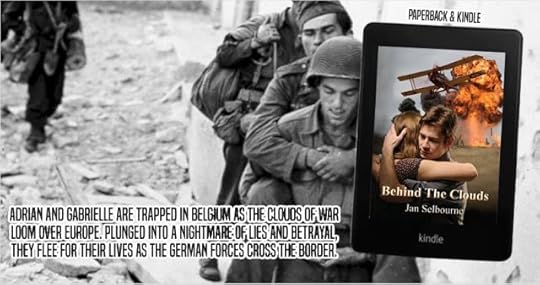
Jan Selbourne
 Jan Selbourne grew up in Melbourne, Australia. Her love of literature and history began as soon as she could read and hold a pen. Her career started in the dusty world of ledgers and accounting then a working holiday in the UK brought the history to life. Now retired, Jan can indulge her love of writing and travel. She has two adult children and lives near Maitland, New South Wales.
Jan Selbourne grew up in Melbourne, Australia. Her love of literature and history began as soon as she could read and hold a pen. Her career started in the dusty world of ledgers and accounting then a working holiday in the UK brought the history to life. Now retired, Jan can indulge her love of writing and travel. She has two adult children and lives near Maitland, New South Wales.Connect with Jan: Facebook • Twitter • Linkedin • Nomad Authors.
Published on January 07, 2020 20:00
January 6, 2020
#BookReview — For Those Who Dare by John Anthony Miller #HistoricalFiction @authorjamiller
 For Those Who DareBy John Anthony Miller
For Those Who DareBy John Anthony Miller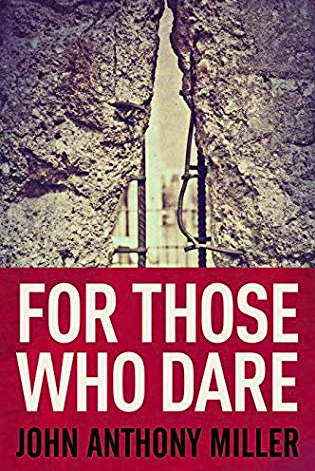 East Berlin, 1961. Kirstin Beck is determined to escape to the West. She watches from her townhouse window as the border with West Berlin is closed, and a barbed wire fence strung through the cemetery behind her house. With a grandmother in West Berlin that needs her, Kirstin knows she has to go.Tony Marino is an American writer living in West Berlin. As he watches the nearby construction progress, he sees a beautiful woman looking from her townhouse window. Kirstin holds up a sign for Tony to see.HELP ME.The two hatch a plan for Kirsten to get over the border, but the mission is not easy. With the Stasi closing in on them, Kirstin and Tony enter a kaleidoscope of deceit and danger, determined to attain freedom at any cost. But in a country torn between communism and capitalism, can Kirstin escape the world she can't endure?
East Berlin, 1961. Kirstin Beck is determined to escape to the West. She watches from her townhouse window as the border with West Berlin is closed, and a barbed wire fence strung through the cemetery behind her house. With a grandmother in West Berlin that needs her, Kirstin knows she has to go.Tony Marino is an American writer living in West Berlin. As he watches the nearby construction progress, he sees a beautiful woman looking from her townhouse window. Kirstin holds up a sign for Tony to see.HELP ME.The two hatch a plan for Kirsten to get over the border, but the mission is not easy. With the Stasi closing in on them, Kirstin and Tony enter a kaleidoscope of deceit and danger, determined to attain freedom at any cost. But in a country torn between communism and capitalism, can Kirstin escape the world she can't endure?
“I think once you’ve tasted freedom, it’s very hard to lose it.”
The border between East and West Berlin had been closed before, but as Kirstin Beck watched as the barbed wire was rolled out, she feared that this time the East German Communist Government had something very different in mind for its citizens. They said they wanted to stop the evil plague that is capitalism from creeping inside their country and corrupting the populous, but everyone knew the real reason. The wall was built to keep the East Germans in.
How Kirstin wished she had left the day before the border had closed, but there had been no hint, no warning. Kirstin had a grandmother in West Berlin, and she was desperate to meet her daughter that had been so cruelly snatched away from her years ago. Kirstin had to escape this imposed isolation, somehow. However, who could she turn to for help? The Stasi were everywhere. They could be anyone. Her husband could be one for all she knew. If Kirstin were to escape, then she had to be careful — her very life depended on it.
American citizen, Tony Marino, had been commissioned to write a History of Nations series. He had been in Germany for the past two months visiting historical sites, taking notes. His editor had wanted him to compose a History of Germany, but what Tony had not expected was to be watching and participating in history as it happened. Nor had he expected to be communicating, via a small handheld chalkboard to a woman across the street in East Berlin, who was asking him for help. Tony had always shied away from commitment, but there was something about this woman and her plight, which tugged at his heart-strings.
With Tony’s help then maybe, just maybe, Kirstin would be able to flee across the border and make a new life for herself, in West Berlin. However, Kirstin has roused the suspicion of Karl Hofer, the Minister of State Security, and he is not a man to be crossed.
If it is a new life in West Berlin that Kirstin wants, then she must prepare for the consequences if her escape attempt fails. For Those Who Dare by John Anthony Miller is a compelling account of one woman’s desperate longing for the freedom that those who live on the other side of the wall from her have. It is unashamedly moving, and I found myself close to tears on more than one occasion as this despairing fog of fear descends upon, not only the heroine but the populous of East Berlin. Kirstin, like others, is willing to risk everything for a chance to be free and to live the life that is being denied to her. Through this story, we see the devastating impact that the Berlin Wall created for those living in East Berlin as well as the daring escapes and acts of heroism from ordinary people who just wanted a better life for themselves and their families.
With an eye for the historical detail, Miller has penned a compelling account about life in East Germany during the German Democratic Republic’s rule. I thought the contrast between East and West Berlin was depicted with great skill and diligence. Miller describes a city that is cut cruelly in half because of opposing principles and political beliefs. West Berlin is a land of plenty, whereas East Berlin is a land of mistrust, fear, and relentlessly long queues for necessary provisions. The contrast could not be more apparent.
The sheer scale of the operation in creating what was to become known as the Berlin Wall has been meticulously described within the pages of this book. As has the confusion that the citizens felt as their lives were irrevocably changed forever by barbed wire, armed guards and a 3.6 metre high concrete wall. I thought Miller has captured the very essences of what it must have been like to live in East Berlin during this time of change and uncertainty. The despairing knowledge that those from the East were cut off from family, friends, jobs and places of education is harrowing, as is the brutality of the treatment of those who spoke out against the State, or who dared to try and escape. Miller has brought this recent past very vividly back to life. I adored the characterisation of Kirstin Beck. Unlike conventional heroines, Kirstin isn’t a strong woman, but she is driven by desperation. She cannot live the way the government wants her to, and she risks everything, including her life to cross the border. I thought Kirstin’s portrayal was really rather wonderful. Kirstin’s determination to not give up, and to achieve her goal made her a highly desirable heroine for modern readers, but also a very realistic one for the time this book is set in.
On the other side of the wall is the hero of this story, Tony Marino. Like Kirstin, Tony is an unlikely hero. He is a writer, the idea of commitment leaves him running for the hills, but there is almost a sense of destiny in Tony when he strikes up this friendship with the woman across the street. He is determined to help her, despite what that could mean for himself. For the majority of this book, Tony has no idea what he is doing, and he is in completely over his head, but he promised Kirstin he would do everything that he could to help her, and he is not willing to go back on that promise. I thought Tony’s portrayal was fabulous, and it drove this story forward. It also made me stop and think about what I would have done if I were in his shoes. It is a very thought-provoking story as well as being a really entertaining one.
There are several antagonists in this book, most noticeably, Karl Hofer, the Minister of State Security. Hofer seems to take delight in frightening and threatening the citizens of East Berlin. His character brings a great deal of menace to this story, and he always seems to be one step ahead of the protagonists. He is a formidable opponent to put against our brave protagonists.
Another antagonist, which I think I may well have loathed even more than Hofer, is Kirstin’s husband, Professor Steiner Beck. Steiner is thoroughly indoctrinated with communism principles, and he seems to relish spying and reporting people — sometimes, for things they have not even done. He basks in the power that he thinks he has. I found his character incredibly disturbing.
Miller has not only penned some remarkably charismatic protagonist that makes a reader root for, but he also has a visceral understanding of what makes history worth reading. Miller’s fast-paced narrative and his non-stop action make this book highly desirable. For Those Who Dare is a novel that is full to the brim of cliff-hanger action and nail-biting suspense. And if you like a good plot-twist, then this book is definitely for you.
For Those Who Dare by John Anthony Miller has a lot to recommend it. It has everything fans of quality Historical Fiction look for in a novel.
I Highly Recommend.
Review by Mary Anne Yarde.The Coffee Pot Book Club.
Pick up your copy ofFor Those Who DareAmazon UK • Amazon US
John Anthony Miller
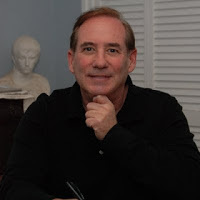 Motivated by a life-long love of travel and history, John Anthony Miller's books are normally set in exotic locations during eras of global conflict. Characters must cope and combat, overcoming their own weaknesses as well as the catastrophes spawned by tumultuous times. He's the author of To Parts Unknown, When Darkness Comes, In Satan's Shadow, and All the King's Soldiers. He lives in southern New Jersey with his family.
Motivated by a life-long love of travel and history, John Anthony Miller's books are normally set in exotic locations during eras of global conflict. Characters must cope and combat, overcoming their own weaknesses as well as the catastrophes spawned by tumultuous times. He's the author of To Parts Unknown, When Darkness Comes, In Satan's Shadow, and All the King's Soldiers. He lives in southern New Jersey with his family.Find out more about John and his books: Website • Amazon • Goodreads • Twitter.
Published on January 06, 2020 21:00
The Coffee Pot Book Club
The Coffee Pot Book Club (formally Myths, Legends, Books, and Coffee Pots) was founded in 2015. Our goal was to create a platform that would help Historical Fiction, Historical Romance and Historical
The Coffee Pot Book Club (formally Myths, Legends, Books, and Coffee Pots) was founded in 2015. Our goal was to create a platform that would help Historical Fiction, Historical Romance and Historical Fantasy authors promote their books and find that sometimes elusive audience. The Coffee Pot Book Club soon became the place for readers to meet new authors (both traditionally published and independently) and discover their fabulous books.
...more
...more
- Mary Anne Yarde's profile
- 159 followers



